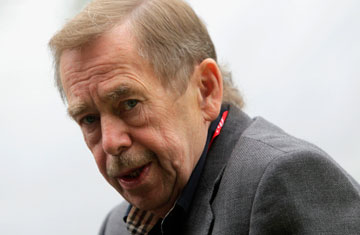
Former Czech president Vaclav Havel speaks to the media during the filming of a movie based on his play "Leaving" in Ceska Skalice in this July 20, 2010 file photo.
The enormous complex that is called Prague Castle imposes itself from a hill overlooking the city's beautiful bridges. It has been the seat of power not only in the country's modern period but for centuries, when the country was then Bohemia, a major power and player in the troubles and wars of central Europe. And it was to the Castle that Vaclav Havel came when a popular rising brought down the Communist regime that ruled what had become Czechoslovakia, a playwright thrust into power, a philosopher who had become king.
People began gathering at Prague Castle again on Sunday, Dec. 18, shortly after the news broke that Havel had died. They lit candles there — as well as in public squares around the country — to pay homage to him. For almost 13 years, he presided from the castle over the nation's transformation from Soviet-bloc entity to a respected member of contemporary Europe. And, after leaving office in 2003, he presided over the nation's conscience as it seemed to careen too quickly into capitalism.
"It's a huge loss. Vaclav Havel was the symbol of 1989 changes, he had my respect and deserves the higest honors from the state," said Czech Prime Minister Petr Necas in reaction to Havel's passing. "He pushed for our country's pro-western orientation. He did a great deal for the transformation of the society, for peaceful transition to democracy, but also for integration of the Czech Republic into the North Atlantic Alliance and European Union. In the 90s, he was a symbol of the Czech Republic and gave our country on the international scene significantly greater weight than what belonged to a small country in the center of Europe."
A couple of years after he left the presidency, a survey by Czech Television, the national public broadcaster, rated Havel the third greatest Czech after Charles IV, a medieval Bohemian King, and Tomas Garrigue Masaryk, the humanist politician and philosopher who in 1918 became Czechoslovakia's first president and in whose footsteps Havel was widely seen as following. As a former president, Havel continued to wield considerable influence over public opinion on a variety of political, environmental and human rights issues, both domestic and international. In many ways, he grew bolder, no longer constrained by government interests and diplomatic protocol.
At home, he endorsed the Green Party in the run-up to last year's parliamentary elections and spoke in favor of changing the country's constitution to allow direct presidential elections. In 2009, he opposed a government plan to pay drivers for junking their old cars, a move defended by politicians as necessary in order to preserve jobs in the country's crucial car manufacturing sector. Havel likened their view to defending concentration camps in order to preserve the jailers' jobs.
Internationally, Havel wholeheartedly supported European integration and often spoke out against human rights violations. He repeatedly expressed support for political opposition in Cuba and Belarus, and also monitored human rights violations in places like Burma, Tibet and North Korea. Last year, Havel tried and failed to deliver a letter to the Chinese president protesting the imprisonment of dissident and Nobel Peace Prize awardee Liu Xiaobo, a man who was inspired by Havel's role in writing Charter 77, the human rights manifesto that had a profound influence in the Soviet bloc.
His liberal views put him at frequent loggerheads with Vaclav Klaus, a conservative politician and Europe's leading Euroskeptic who succeeded Havel as president. (Klaus once said that "Vaclav Havel, who never wanted ... either free market or regular politics or political parties, believes that it's possible to govern through humanistic appeals.")
As Havel aged, his health problems multiplied. (He only gave up smoking after a 1996 lung cancer surgery.) At the end of January, 2009, he spent more than two weeks in hospital with severe respiratory problems that were deemed life-threatening. He was also hospitalized with repeated cases of arrhythmia and a broken hip.
As 2011 progressed, his public appearances grew increasingly rare. Although he made it in March to the Prague premiere of Leaving, his debut as a movie director, which tells the story of a former chancellor who is being forced out of a government villa by an antagonistic successor (a not too veiled reference to Klaus), he was visibly frail, leaned on a cane and tripped and fell while climbing to the stage to address the audience following the movie's screening. He skipped the Karlovy Vary International Film Festival this summer. Nor did he make a public appearance on Nov. 17 for this year's anniversary of the Velvet Revolution that brought him to power.
Still, he continued to receive visitors and be publicly engaged. In April, he butted heads with President Klaus over ways to deal with a bark beetle infestation in the Sumava national park in south Bohemia. In June, he sent an open letter to the Czech Republic's Minister of Culture, opposing the demolition of a handful of buildings on Prague's Wenceslas Square. "Dear Mr. Minister, let me publicly express my sadness over the agreement that you have given to demolish buildings on Wenceslas Square," he wrote. "Greater than my remorse over the demolition is my fear of the monster, which will be on the site of the demolished buildings. I realize that I won't change a thing, but feel obligated, nevertheless, to speak up and tell you my opinion."
But he was not able to do one last thing. He had always wanted to write one more play. When he died in his sleep this morning at his country house, that dream would be forever unrealized.
